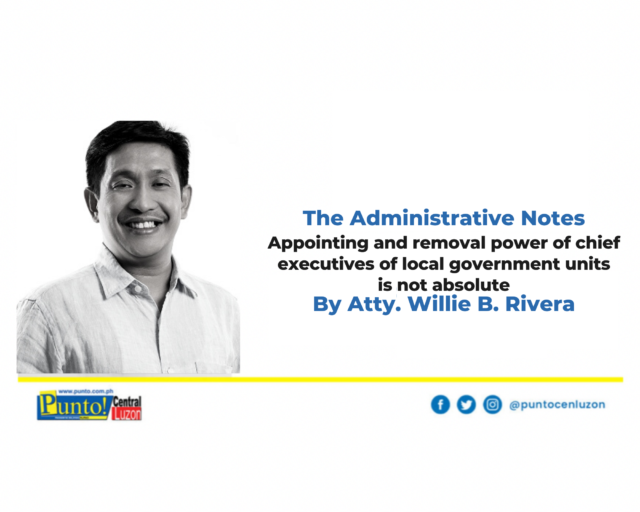ONE OF the fundamental principles in administrative law which I am teaching at Bulacan State University (BSU) is the tenet that the power to appoint includes the power to remove. While this may be true in my case , as the appointee of Mayor Carmelo “Pogi” Lazatin as his current City administrator; the same is not necessarily applicable in the case of the civil servants of the city who are scheduled to be appointed this year.
For government employees, there exists a Personnel Selection Board, composed of the City Mayor, City Administrator, City Human Resource Officer, Chairman of Human Resource, City Council, which is tasked to recommend to the Mayor at least three (3) qualified individuals to any vacant position the city has. Based on their merit and fitness, anyone of those recommended by the board may be appointed to the vacant position. Such is the procedure under the local government code. Stated differently, the buck stops with the Mayor.
However, a different rule and procedure apply to elected officials.
Section 44 (b) of the local government code provides:
Section 44. Permanent Vacancies in the Offices of the Governor, Vice Governor, Mayor, and Vice Mayor.
xxx
(b) If a permanent vacancy occurs in the office of the punong barangay, the highest- ranking sanggunian barangay member or, in case of his permanent inability, the second- highest ranking sangggnian member shall become the punong barangay.
A clear example of a permanent vacancy in the barangay was the death of Punong Barangay Carmelo “Tarzan” F. Lazatin who was elected Punong Barangay of Barangay Balibago. Upon his death, Kagawad Rodelio “Tony” Mamac, who was the no. 1 elected barangay kagawad, assumed the post as the highest ranking barangay official.
In the case of Barangay Kagawad Alfonso Bonifacio, upon his death, the barangay kagawads nominated his daughter Jennifer Bonifacio-Balajadia, a medical technologist by profession, to take the post left behind by her late father, Barangay Kagawad Alfonso Bonifacio. The barangay council passed a resolution recommending the appointment of Jennifer Bonifacio-Balajadia, which Mayor Carmelo “Pogi” Lazatin Jr. confirmed.
Recently, Barangay Kagawad Noli D. Bonus of Barangay Salapungan, succumbed to an untimely death. Upon his death, there is now a permanent vacancy in the barangay council pending the nomination and approval of Barangay Kagawad Noli Bonus’ successor. In this case, the City Mayor Carmelo “Pogi” G. Lazatin Jr. would confirm the nomination.
While Mayor Carmelo “Pogi” G. Lazatin Jr. has the authority to fill in permanent vacancy positions upon the recommendation of the barangay council, Mayor Carmelo “Pogi” Lazatin Jr. has no authority to remove erring barangay officials.
Under the Local Government Code, it is provided, that;
Section 60 of the Local Government Code conferred upon the courts the power to remove elective local officials from office:
Section 60. Grounds for Disciplinary Actions.—An elective local official may be disciplined, suspended, or removed from office on any of the following grounds:
x x x x.
An elective local official may be removed from office on the grounds enumerated above by order of the proper court.
In relation to Section 60, Section 125 of the Local Government Code, provides, that;
Article 125. Grounds for Disciplinary Actions. x x x.
x x x x.
(b) An elective local official may be removed from office on the grounds enumerated in paragraph (a) of this Article by order of the proper court or the disciplining authority whichever first acquires jurisdiction to the exclusion of the other.
Clear, therefore, that only the proper courts could remove a local official from office. “The rule which confers to the proper courts the power to remove an elective local official from office is intended as a check against any capriciousness or partisan activity by the disciplining authority. Vesting the local legislative body with the power to decide whether or not a local chief executive may be removed from office, and only relegating to the courts a mandatory duty to implement the decision, would still not free the resolution of the case from the capriciousness or partisanship of the disciplining authority.”
In the case of Barangay Malabanias, where Punong Barangay Reynaldo Gueco and some of his barangay kagawads are presently on preventive suspension, the Mayor nor the Sangguniang Panlungsod cannot order their removal from office, as the courts are exclusively vested with this power under Section 60 of the Local Government Code. Thus, if the acts allegedly committed by the barangay officials are of a grave nature and, if found guilty, would merit the penalty of removal from office, the case should be filed with the regional trial court.
At most, the most extreme penalty that the Mayor or the Sangguniang Panlungsod may impose on the erring elective barangay official is suspension; if it deems that the removal of the official from service is warranted, then it can resolve that the proper charges be filed before the Regional Trial Court.
While it is a settled principle that the “power to remove is inherent in the power to appoint” conferred to the President by Section 16, Article VII of the Constitution, this power of removal is not an absolute one which accepts no reservation. In other words, the appointing authority is not vested with the authority to remove at their own will or at their pleasure. Removal may only for just cause as enumerated in P.D. No. 807, otherwise known as the Civil Service Decree of the Philippines. and in accordance with procedural due process.
It cannot be denied that government actions, whether to appoint or remove, is inspired with noble intentions, all geared towards the betterment of its people, it must be remembered that “The end does not justify the means.” No matter how admirable the act is, but if the means to be employed in accomplishing it is contrary to constitutional parameters, then it cannot be accepted. As it is, the Constitution and its enshrined principles must always be upheld.





